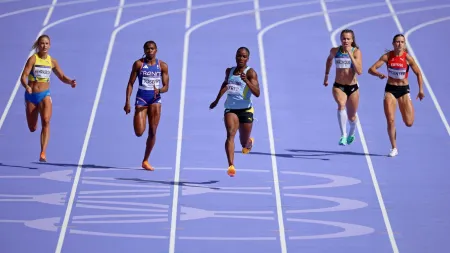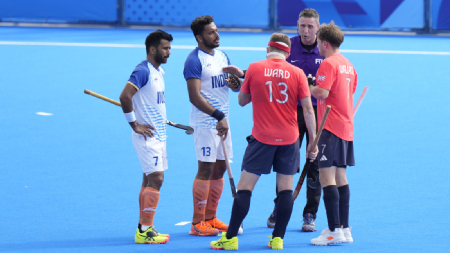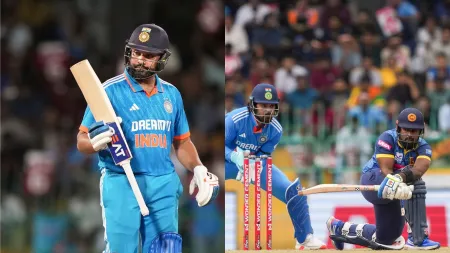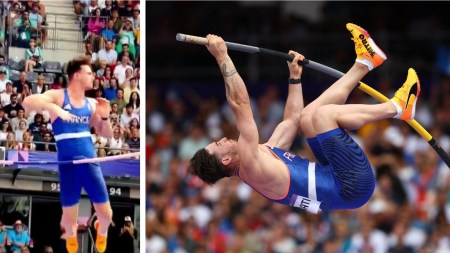Belief, courage, and tactical tweaks, how India plotted a 10-man heist over Great Britain
Somewhere in the Alps, Team India was forewarned about facing a scenario ‘when shit happens.’
Such a moment, the coaches cautioned the players, would take place without warning, disrupt their best-laid plans and require them to improvise. “It always happens in big tournaments. You can’t predict what and when, and you can’t prepare for it. But mentally, you should be ready,” says Paddy Upton, the men’s team psychologist.

In the 17th minute of the quarterfinal against Britain, it did happen. Going shoulder to shoulder in a battle for possession with Will Calnan, Amit Rohidas raised his stick dangerously and it hit the Brit on his head. Calnan fell to the ground and the umpire brandished the Indian defender a red card — only the fourth time in the last 11 years that a player has been sent off at a major tournament.
India went on to win, 4-2 via penalty shootouts, but it wasn’t before they were put through a whole lot of adversity. India of old would have probably crumbled in such a situation. But on Sunday, at the sun-bathed Stade Yves-du-Manoir, they showed tactical dexterity not commonly associated with the Indian team.
Rohidas has a dual role in the team — he is one of the central figures in the defence and during penalty corners, he is the first rusher; sprinting towards the drag-flicker to block his angles, even if it means taking a blow. His suspension triggered a series of tactical and personnel changes. India started the match cautiously, employing a half-court press and trying to find an answer to Britain’s close, aggressive man-marking.
Calm rejigging
But immediately after the red card, two things happened. Captain Harmanpreet Singh, who was playing unusually high up the field, retreated to deep defence. Joining him in the backline was Manpreet Singh, usually a central midfielder. To plug the hole in the back line, Fulton had to sacrifice his playmaker.
“We practice different match situations and plan how we should play if someone gets a green or yellow card (leading to 2 or 5-minute suspensions). But this isn’t a common situation, to play almost three quarters with one man less,” Manpreet said. “It was unexpected. But we train to play with structures in case of one man down and in that, I had to fall back in defence to cover up.”
Then, the next instinct was to score a goal. That, Fulton said, was crucial so that Britain would chase the game and they could lay a defensive trap to frustrate the opponents. “We needed something to defend so they’d come (to attack) and that would help our tactic. Then we needed to push it as far as possible,” Fulton said.
Harmanpreet’s goal ticked that box, within five minutes of Rohidas’s red card. From that moment, India changed their shape, aware that it would be impossible for them to attack with a man short. So, the forward line retreated deep into their half, forming the first line of defence. The midfielders, a few paces behind them, created a second layer and the defenders were within a high-fiving distance of the goalkeeper. Marshalling the men in front of him was goalkeeper PR Sreejesh, playing his last international tournament.
 Paris 2024 Olympics – Hockey – Men’s Quarter-final – India vs Great Britain – Yves-du-Manoir Stadium, Colombes, France – August 04, 2024. Sreejesh Parattu Raveendran of India defends a penalty shoot by Phillip Roper of Britain during the penalty shootout. (REUTERS/Anushree Fadnavis)
Paris 2024 Olympics – Hockey – Men’s Quarter-final – India vs Great Britain – Yves-du-Manoir Stadium, Colombes, France – August 04, 2024. Sreejesh Parattu Raveendran of India defends a penalty shoot by Phillip Roper of Britain during the penalty shootout. (REUTERS/Anushree Fadnavis)
Think of how a team would structure itself on an entire field in a 4-3-2 system. India crunched that whole thing in their defensive third. The triple layer protected the central areas of the pitch, blocking the direct passing lines towards the goal. “We wanted to ensure that we did not allow them to play balls from the central areas. It was okay if they entered from the side because the worst that would happen was conceding a penalty corner. But we had faith in Sreejesh; he is one of the best goalkeepers,” vice-captain Hardik Singh said.
There are plans on paper and then there’s execution of those plans. In the past, India’s players have been notorious for throwing well-thought-out plans out of the window at the first sign of stress. And there couldn’t have been more pressure on them than Sunday when an Olympic semifinal berth was at stake.
There was no precedent, either. Never in the Olympics has a team been reduced to 10 men. To progress to the last four, India had to improvise their plan and execute it to perfection. For once, they did. “We dug deep, Sree was immense. But when you talk about the defence, it’s also about showing love for your teammate by covering him and helping him,” Fulton said.
If Britain got behind Lalit Upadhyay and Gurjant Singh, they would run into Vivek Sagar Prasad and Raj Kumar Pal. If they beat them, there would be Sumeet and Sanjay. Standing like a rock at the back, behind all of them, was Sreejesh. This one time when Sreejesh was beaten, Manpreet and Jarmanpreet Singh were there to stop the ball from going in.
This wasn’t blind defending, there was a structure and method to it. “It wasn’t pretty, it’s never going to be pretty with 10 men,” Fulton admitted. But it worked. Britain forayed into India’s circle 24 times. They scored just once. They had nine penalty corners. Each time, they were thwarted.
There were times when it looked like India would not be able to last physically and mentally in the searing heat of Paris. Especially when the clock ticked down in the final quarter. “It felt to us that the clock was ticking in slow motion. Even one second felt like 10,” Hardik said, breathing heavily and sweating profusely. “But that’s life, whenever adversity hits you, you have to come back stronger. But today, we played for those who believe ki hockey India ki hai (hockey’s home is India).
By the end of the 60-minute grind, the players were battered, bruised. Fulton, his voice gone hoarse, reiterated the words said in the Alps: “When shit happens, get together.”
Olympics 2024- Manu Bhaker reaches final, targets her third Olympic medal today
- Paris Olympics: Shooting delivers third medal for India as Swapnil Kusale strikes bronze
- Coach Jaspal Rana details how life-work balance helped Manu Bhaker win two Olympic medals
How the champs were knocked out
The drama-filled India match was followed by another crazy quarterfinal. World No 1 Belgium were dramatically knocked out by Spain, ranked 8th in the world. Spain had a 3-1 lead with 3 minutes to go, Belgium then scored their 2nd of the match to make it a dramatic finish. But it didn’t end there. With the clock running out, Belgium made a circle entry but a Penalty Corner wasn’t given. Spain started celebrating their win. Belgium then surrounded the referee asking for a PC because they had burned their review just a minute back. Then the official from the far side walked up to the umpire on the near side and told him a PC must be given, which is not unusual in hockey. So, Spain had to regather themselves to defend a penalty corner from the legendary Hendrickx who had just scored earlier. But the Spanish goalkeeper made the save and the ball went out of the circle. And Spain got to celebrate once more, this time for real.
Disclaimer: The copyright of this article belongs to the original author. Reposting this article is solely for the purpose of information dissemination and does not constitute any investment advice. If there is any infringement, please contact us immediately. We will make corrections or deletions as necessary. Thank you.





